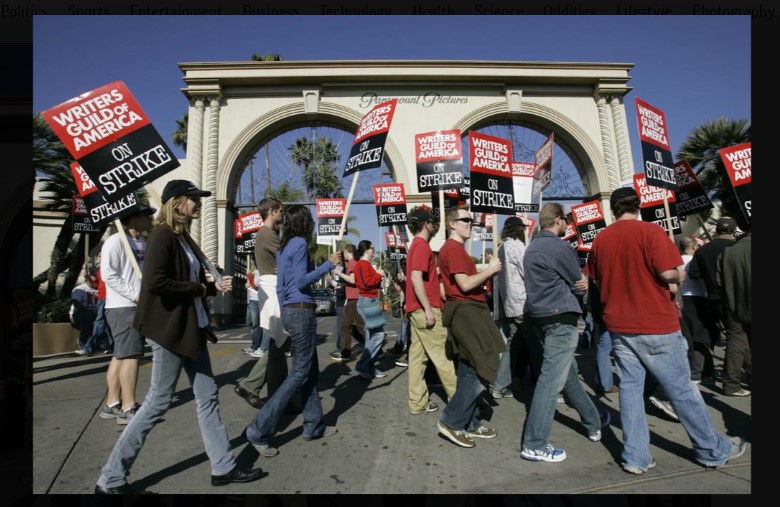Hollywood Writers in Deal to End US Studio Strike
In a historic turn of events, the Writers Guild of America (WGA) has announced a potential resolution to the nearly five-month-long strike that has had the entertainment industry, and indeed the entire nation, on edge. The strike , which began on May 2nd, has not only disrupted the production of beloved TV shows and films but has also sent shockwaves through the U.S. economy, with an estimated loss of $5 billion.
A Glimpse into the Strike
The Writers Guild of America, representing the talented scriptwriters behind some of our favorite shows and movies, has been locked in a bitter dispute with studio executives. While it’s indeed one of the longest strikes to hit Hollywood in decades, it has also been one of the most impactful.
Unprecedented Gains and Protections for Writers
The WGA recently declared that they have achieved something truly exceptional – a tentative deal that promises significant benefits and safeguards for writers. This announcement has sent ripples of hope throughout the entertainment industry. However, it’s essential to note that the WGA members still need to vote to ratify the deal officially.
The Cost to the US Economy
The strike’s impact has been far-reaching, affecting some of the most popular shows, including “The Last of Us,” “Billions,” “Stranger Things,” “The Handmaid’s Tale,” “Hacks,” “Severance,” “Yellowjackets,” “Abbott Elementary,” and several daytime and late-night talk shows. Besides the disruption in content production, it has raised concerns about the financial health of the industry.
Economist Kevin Klowden from the Milken Institute estimates that this strike has cost the U.S. economy an astonishing $5 billion. The repercussions have been felt not only by the writers but also by various ancillary sectors within the entertainment industry, from caterers and costume suppliers to carpenters and camera operators.
Key Issues at Stake
The strike revolved around several key issues that have been at the heart of the negotiations between the WGA and the Alliance of Motion Picture and Television Producers.

1. Impact of Artificial Intelligence
One of the central concerns voiced by the writers was the potential threat posed by artificial intelligence (AI) to their creative talents. As technology continues to advance, writers are increasingly worried about AI taking over tasks traditionally performed by human writers.
2. Staffing Levels
Another point of contention was staffing levels. Writers wanted assurances about their employment prospects and job security, ensuring that they wouldn’t be left in the lurch when it came to job opportunities.
3. Royalty Payments for Streaming Shows
The issue of royalty payments for streaming shows became a significant sticking point. Writers argued that the residuals they received from streaming platforms were a fraction of what they would earn from broadcast TV shows.
In the traditional broadcast model, writers received additional payments when their programs were rerun. However, the rise of streaming services disrupted this model, leading to the need for adjustments in compensation.
The Path to Resolution
Negotiations between the WGA leadership and the Alliance of Motion Picture and Television Producers have been arduous. While a proposed deal has been announced, both parties still need to finalize the details before the strike can officially come to an end.
The WGA’s message regarding the proposed deal is cautiously optimistic. While they have suspended picketing as a gesture of goodwill, they are not yet ready to call off the strike until all the i’s are dotted and the t’s are crossed in the contract.

What’s Next?
Hollywood is collectively holding its breath as it anticipates the end of this protracted strike. Variety has reported that staff on late-night talk shows could return to work as early as Tuesday following the announcement. Broadcasts, which have been sorely missed by viewers, may resume as soon as October.
A Unified Front
The strike has also revealed the remarkable unity within the entertainment industry. Many related sectors, such as catering, costume supplies, carpentry, and camera operations, have rallied in support of the striking writers. Their solidarity demonstrates the interconnectedness of the industry and its collective determination to find a resolution.
SAG-AFTRA’s Support
Actors, represented by the 160,000-strong SAG-AFTRA performers’ union, have been on strike since mid-July. They have stood alongside the writers on the picket lines, offering their unwavering support. SAG-AFTRA congratulated the striking writers on their incredible strength, resiliency, and solidarity, and they remain on strike in their TV/Theatrical contract, pushing for a fair deal.
A Positive Outcome
In the midst of this prolonged strike, the people of California have been impacted, and their Governor, Gavin Newsom, acknowledges the importance of the entertainment industry in the state. He states, “California’s entertainment industry would not be what it is today without our world-class writers.”
Governor Newsom is grateful that the two sides have come together to reach an agreement that benefits all parties involved, potentially revitalizing a significant sector of California’s economy.
As Hollywood waits with bated breath for the final resolution, the hope is that this tentative deal represents not just an end to a strike but a new beginning for writers and the entertainment industry as a whole.